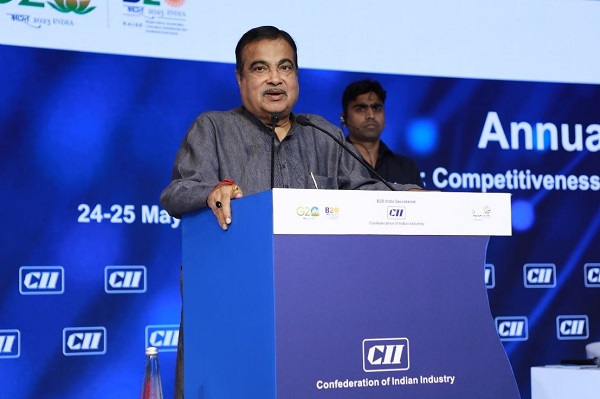
New Delhi, (Samajweekly) Nitin Gadkari, the Union Minister of Road Transport and Highways on Wednesday said that the Centre was committed to enhancing the tourism sector and strengthening the country’s infrastructure which were positively impacting job creation.
He was speaking at the CII Annual Session 2023 here. Under the theme ‘Future Frontiers, Competitiveness, Technology, Sustainability, Internationalisation’, Gadkari highlighted the significant progress made in these areas and the positive impact it has had on job creation.
Gadkari acknowledged the rapid improvement in the tourism sector and cited the feedback received from the Chief Minister of Uttarakhand, who reported a notable increase in tourist numbers compared to the previous year.
Recognising the importance of efficient connectivity, Gadkari revealed plans for the construction of the Dehradun-Delhi Highway, which will significantly reduce travel time between the two destinations, as well as the ongoing projects related to the Char-Dham Yatra and the development of Masoori’s tunnel.
To further bolster the tourism industry, the government has embraced 260 proposals, amounting to Rs 1,30,000 crore, focused on ropeway cable cars and funicular railways. These initiatives will be implemented through public-private investments, fostering sustainable and accessible transportation options for tourists across the country.
Emphasizing the government’s commitment to improving logistics and reducing costs, Gadkari highlighted the Economic Corridor and Green Express Highways projects. He expressed his belief that these initiatives would decrease logistics costs from 14 to 16 per cent to a remarkable 9 per cent, leading to increased export opportunities and a subsequent rise in employment.
Gadkari also emphasized the importance of private sector collaboration in the development of 670 wayside amenities across the country, including charging stations, gas stations, and restaurants built to international standards.
Looking toward the future, the Minister emphasized the potential of heliports and drones in futuristic technology. He noted the development of drones capable of carrying up to 200 kg, with future models anticipated to transport four passengers simultaneously. Additionally, he highlighted plans to construct 16 tunnels in Jammu and the proposed Delhi-Katra Highway, which will allow Delhi residents to reach Katra within six hours.
In line with the government’s push for sustainable and eco-friendly alternatives, Gadkari disclosed plans to invest around Rs 16 lakh crore in the ethanol vehicle market and explore the use of methanol as a substitute for diesel. The successful testing of 25 buses powered by methanol in Bengaluru was mentioned, with a projected production of 30 lakh tons of methanol in collaboration with farmers in the future. Furthermore, Gadkari underscored the potential of hydrogen-powered vehicles, aiming to transform India from an energy importer to an energy exporter.
Gadkari also addressed the burgeoning electric vehicle sector, revealing that 400 startups have emerged to manufacture electric buses, along with the introduction of e-cars, e-rickshaws, and e-buses. He acknowledged the need to improve the conditions of state transport systems and combat diesel thefts, expressing interest in implementing the London bus model in India and ultimately aiming for a fleet of two lakh buses.
Gadkari further announced plans for the Sky Bus service, connecting Dhaula Kuan in Delhi to Gurugram in Haryana, which will alleviate traffic congestion for the commuters.
Concluding his address, Gadkari reiterated the government’s commitment to Prime Minister Narendra Modi’s vision of making India a five trillion-dollar economy. He highlighted the creation of 4.5 crore jobs through the promotion of tourism, the development of top-quality roads, and the provision of opportunities for startups. Additionally, he shared the government’s innovative approach to utilizing 25 lakh tons of garbage.








